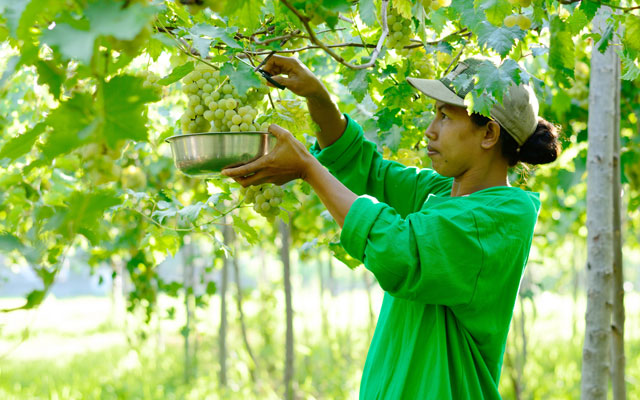On Bali's northern coast, Mimi Hudoyo discovers a locally-owned winery that sources grapes from local farmers and turns them into award-winning juices, planting Indonesia on the world wine map along the way.
Why
Indonesia, or in particular Bali, is hardly known on the world winery map. It is perhaps only a handful of people who know that the island actually grows its own grapes in Buleleng, on the north coast of Bali, which yields around 800,000 bottles a year at Sababay Winery in Gianyar.
Over the past three years, Sababay’s wine collections have won more than 30 awards and accolades at regional Asia wine competitions such as the Korean Wine Challenge, Sakura Wine Awards and China Wine & Spirit Awards. It also won an award at the AWC Vienna International Wine Challenge 2017, the largest wine competition with wine producers from 40 countries.

What
I was lucky to visit the Winery Garden after a Muscat harvest, and my group managed to taste the grapes and its juice.
Sababay uses two types of grapes, Alphonse Lavallée, black local grapes – which are actually table grapes, and Muscat Saint Vallier, green grapes. Both are grown at the vineyards which are owned and cultivated by local farmers, in collaboration with the Asteroid R&D Vineyard. The winery is located a four-hour drive away from the vineyard.
Sababay was founded in 2010 by an Indonesian lady, Mulyati Gozali, who is now president director of the company.
The brand, Sababay, is derived from the winery’s location at the Bay of Saba Beach.
Mulyati was saddened by the condition of local farmers, whose grape harvests were sold at Rp500 (less than US$0.10 then) per kilogramme. As such, she decided to establish a local winery dedicated to using local harvests, and doing so through direct fair trade business practices and integrated farming.
“Grape prices today are about 10 times it used to be, and farmers have been able to expand their vineyard and send their children to universities,” the guide told us.
Mulyati invested in grape processing equipment imported from France, the only one in Indonesia so far; an automatic bottling line from Italy; and fermentation and storage tanks from Indonesia. The company also taught the local farmers how to better grow the grapes, cultivate the soil, and use of fertilisers and seeds to meet the requirements for winemaking.
Sababay’s wines were then created by a renowned Indonesia wine connoisseur Yohan Handoyo and Bordeaux-born winemaker Nicolas Delacressionnere.
Inside the winery, a glass of Sababay’s bestselling Moscato dBali welcomed us, before we were escorted to the fermenting area.
Nicolas, the winemaker, then poured us from a tank a glass of one of the Red Velvet series in the making. He then explained the whole process from the vineyard to bottling. We were then brought upstairs where we were given a chance to taste a series of wines here, as well as learn how to pair them with Indonesian food and snacks.
Yohan explained that while wines were usually paired with western cuisine, Sababay had been working with Indonesian chefs and culinary lovers to create Indonesian food pairings.
The Black Velvet, an easy drinking red, is suitable with ayam pepes a la bumbu Bali (steamed chicken wrapped in banana leaves). Meanwhile, the Pink Blossom, an aromatic rose, can be paired with sate lilit (Balinese-style satay) or gado-gado mixed salad with peanut sauce. The White Velvet, the fruity dry white, can be paired with fish cakes and sweet chilli sauce.
Yohan also revealed that Sababay has been appointed official wine partner of Wonderful Indonesia by the Ministry of Tourism.
How
The winery tour is available on Mondays, Wednesdays and Fridays from 15.00 to 16.30. It will cost Rp180,000 (US$12) per person, and includes the tasting of three wines.
The winery can also organise a private tour for groups from 20 to 150 people. In this case, it will cost Rp300,000 per person, and includes the use of the function room for three hours, exclusive use of the air-conditioned Joglo hall and its surrounding garden, and two glasses of wines. Reservations are mandatory.
A tailor-made programme, such as a tour of the vineyard, can also be arranged.
Verdict
The tour was an eye-opener for me, as I discovered that a Balinese vineyard is able to produce award-winning wines and has helped to improve the livelihood of local grape farmers.
Contact
Email info@sababaywinery.com




















